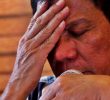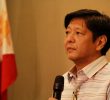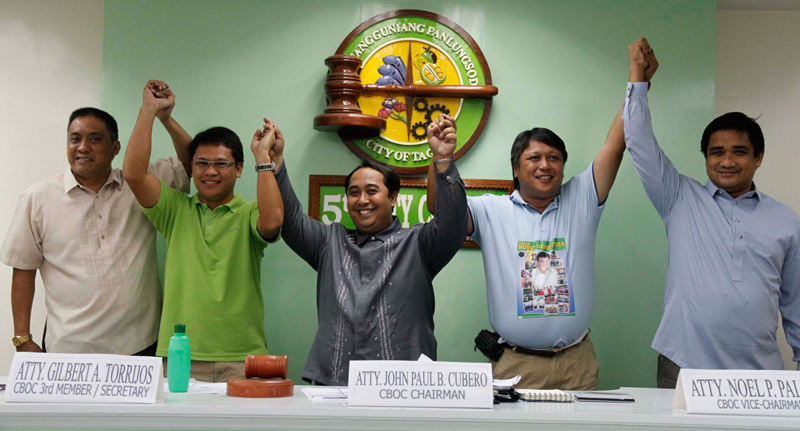The forthcoming national elections, as with all previous elections since the so-called EDSA I “people power revolution” and the parade of bogus republics in the past, will never be a genuine expression of the slogan “from the people, by the people and for the people” much less embody the hope for the vast underprivileged majority to become the real bosses of the country.
Almost all candidates vying for major positions, whether as mayor, congressman, senator, vice president or president, either belong to the big landlord and comprador bourgeoisie classes or from dynasties of bureaucrat capitalists; none belong to the peasant or working classes. Thus, to say that bourgeois elections translate to real people empowerment is nothing short of delusional and deceptive.
At most, people are only used, beguiled by the bourgeois jargon “right of suffrage” to cast their votes to make that peaceful transfer of power from one faction of the ruling class to another faction of the same class. Further, ever since bourgeois elections have been institutionalized in the country, agents of US imperialism always had a hand in ushering to victory the ruling faction that best serves their hegemonic interests in the country.
Philippine elections continue to be an arena lorded over by the ruling classes ñ the big landlords and bourgeois compradors – and the rules of the game remain the same: guns, goons, gold and patronage. Of late, the use of the pre-programmed automated elections system (AES) upgraded the old and obvious schemes of cheating to invisible electronic fraud. Control over established mass media networks as well as the social media also proves to be an advantage.
In the entire course of this electoral process, the more urgent basic issues of peasants, workers and other exploited and oppressed classes of society, such as land reform, national industrialization, sovereignty and patrimony, human rights violations, militarization, economic monopoly and US intervention, are either not highlighted or completely neglected. It is deliberate on the part of politicians to do this in order to avoid accountability for such issues after the elections; thus, they debate and jabber mainly on peripheral or less basic issues.
Not even the Party List system has become truly empowering for the marginalized. Of the 52 congressional seats reserved for Partylist, only 13% genuinely represent the less-privileged. Pseudo-partylists, those fielded by ruling classes and acting as fronts for reactionary ruling parties, have been allowed to enter the Partylist system and now dominate it, making it extremely difficult for the real marginalized groups to win seats. Worse, out of the 257 seats in the entire House of Representatives, less than 3% actually hail from the marginalized. At this juncture, progressive partylist groups should not only aim at winning, they must give primacy to educating the people on the reactionary character of bourgeois elections and its dire impact towards millions of poor and exploited masses.
Conversely, in guerrilla bases in the countryside, genuine people’s elections, where the true people’s representatives are being elected without the influence of guns, goons and gold, are being held, thus the revolutionary people’s government is established. This constituency of the real people’s government will expand correspondingly as guerrilla bases expand and become stronger, and as the armed revolution advances nationwide. The national people’s government will be established once political power on a nationwide scale is seized by encircling the cities from the countryside.
However, the current balance of power favours the ruling class to compel the participation of the masses in bourgeois elections. Meantime, the masses are currently faced with the challenge to choose from among the five presidentiables based on what is advantageous for people’s rights and welfare.
A Roxas victory will shield Benigno Aquino III from incarceration for his crimes against the people, such as DAP, EDCA, the SAF 44 incident, the gross neglect of typhoon victims, the Lumad killings and a host of other despicable acts. He will, no doubt, extend and even attempt to surpass the brutality of Aquino III’s Oplan Bayanihan (OPB), which is now waging an intensified campaign against the people, especially in Mindanao, in its concluding phase. Jejomar Binay has been castigated publicly with evidence after evidence of acts of graft and corruption, which has not only enriched him but his brood as well. While himself a staunch critic of Aquino III’s malfeasance and anti-people policies, Binay, for his part, has not made serious stands on issues, such as wages and land reform, which greatly impact the masses of workers and peasants in the country.
Rodrigo Duterte, for his part, favors the return of the death penalty, which, under the current situation, will only victimize the poor and innocent as well as revolutionaries, but absolve the powerful, influential and those who can bribe fiscals and judges. He has also announced his categorical stand against labor unions. Mirriam Defensor-Santiago’s track record reeks of her loyalty to the ruling classes and her turncoatism for political survival by way of her alliance with the family and main beneficiaries of Martial Law. Grace Poe, even when no major issues have been hurled against her, has yet to prove herself consistent in upholding people’s issues, demands and aspirations.
While these presidentiables may have expressed some favorable stand on issues, such as on the question of drugs, environmental protection and climate change, social services, the peace talks, etc., the people must still be vigilant enough to expose certain issues that may have long term disadvantages to the nation, to wit: charter change that will efface provisions that protect patrimony and sovereignty; fascism akin to the return of Martial law; giving the US more room for political and military interventionism; and, the imposition of pro-imperialist, pro-big landlord and pro-big bourgeois comprador neoliberal economic policies, which provide greater leeway for the incursion and plunder of imperialist corporations, such as mining, agribusiness, energy and others.
NDFP-Mindanao calls on the people to turn this bourgeois elections to the advantage of the people’s struggle. We must strive to educate the masses regarding the real character of the bourgeois elections.
The people must convert and elevate basic issues: land, wages, benefits, human and other basic rights, patrimony, sovereignty into electoral issues and launch mass campaigns that expose and demand for: justice to all victims of human rights violations; an end to militarization; implementation of genuine land reform for peasant, Lumad and Moro people; defense of basic workers’ rights and welfare, including that of overseas Filipino workers; protection against the plunder of natural resources and the destruction of the environment; and, safeguarding the rights, interests and welfare of women, the youth and students.
Unite to expose and isolate candidates who are despotically reactionary!
(Sgd)
Ka Oris
Spokesperson
NDFP-Mindanao










